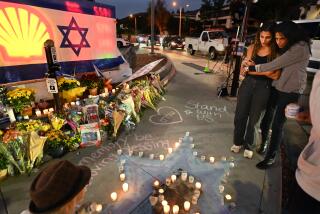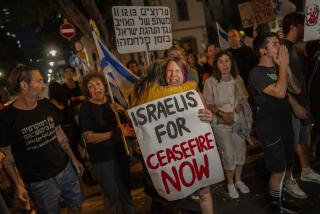PEACEKEEPING : A Death in Cambodia, an Uproar in Germany
BERLIN â The death of Sgt. Alexander Arndt is the nightmare the German government had long feared, his fate precisely what it so desperately had hoped to avoid.
Arndt, a 26-year-old army medic, on Thursday became the first German soldier to die on duty in an area of tension since World War II--shot by an unknown assailant near the headquarters of the U.N. peacekeeping mission in the Cambodian capital, Phnom Penh.
For a people still traumatized by the violence of their countryâs past and deeply divided on the question of its future military role in the world, Arndtâs death has hit like a blockbuster.
âWe now have the bitter experience other nations have had before us,â Defense Minister Volker Ruehe said, referring to other U.N. peacekeepers who have been killed.
Although the news broke too late for some of Fridayâs national dailies, the final editions of several German papers carried the news with banner headlines.
Within hours, virtually every major national politician had commented on the death and its implications. Television news and current events programs late Thursday and Friday concentrated on little else.
As pressure builds, one fact is clear: The incident will test Chancellor Helmut Kohlâs ability to continue his course of committing German forces to U.N.-sanctioned missions despite a questionable legal basis for such action under the German constitution.
At stake is the global peacekeeping role for one of the worldâs best-trained, best-equipped armies.
In the past two years, Kohl has brushed aside legal uncertainties, public disquiet and the protests of political opponents to push through approval for limited German involvement in U.N. operations. He has done so to avoid straining relations with key postwar allies such as the United States, Britain and France, which already share much of the peacekeeping responsibilities.
But the medicâs death in Cambodia is certain to revive the political oppositionâs efforts to place clear, strict limits on the deployment of German military forces outside the Atlantic Alliance area.
The main opposition Social Democrats, for example, want to end German involvement in Somalia.
Within a few hours of Arndtâs death, Karsten Voigt, the Social Democratsâ chief foreign affairs spokesman, had appeared on national television calling for withdrawal of the 1,700 German peacekeepers in Somalia and immediate clarification of the constitutional wording governing such deployments.
In an official statement, the leftist Greens demanded that the government stop âthe official playing down of international military deployments as excursions in developmentâ assistance.
For years before unification, successive West German governments had interpreted this ambiguous wording as limiting German military actions to the NATO areas--a judgment the former victims of German military adventurism heartily endorsed.
Only with unification and the changing global security climate have these same neighbors and allies prodded Germany to join U.N. operations.
With legal challenges to deployments of German forces in Somalia and the Adriatic already pending before the federal Constitutional Court and rhetoric to âbring the troops homeâ certain to rise in the days ahead, Arndtâs death above all will be a test of the public mood in the new Germany.
âSgt. Alexander Arndt wouldnât have wanted us to use his death as a reason to withdraw from our responsibility to the world community,â Ruehe warned Friday in Bonn.
Even the conservative mass-circulation Bild-Zeitung counseled its readers to be tolerant during the public outcry to come. âSoldiers in German history have already died for too many ideas,â the paperâs editor in chief, Claus Larass, wrote in the lead commentary of its Friday editions. âMany, therefore, wonât understand this death. That is something we have to respect.â
Global Tours of Duty
German military forces now engaged in U.N.-linked operations outside the Atlantic Alliance region:
* Somalia--A reinforced transport battalion of 1,700 German soldiers, stationed near the town of Belet Huen, far from Mogadishu. Their task is to provide logistic support for Indian troops, who have yet to arrive.
* Cambodia--A medical unit of 122 soldiers stationed in Phnom Penh, providing support for U.N. peacekeeping force in the country. The unit is scheduled to complete its tour at monthâs end.
* Adriatic--Two ships with combined crews totaling 420 people assisting in the U.N.-imposed embargo against Serbia.
* Bosnia-Herzegovina--About 60 German military personnel participating in airdrops over Bosnia and, from Italy, assisting relief flights into Sarajevo. An additional 160 German Luftwaffe personnel are part of the 620-strong NATO air crews aboard radar planes enforcing the U.N.-sanctioned âno-flyâ zone over Bosnia.
* Iraq--About 40 German Luftwaffe personnel supporting U.N. monitoring staff in Iraq.
* Georgia--Georgian government has requested âa handfulâ--most likely five or six individuals--as U.N. observers in this former Soviet republic racked by civil war. No action has been taken on this request.
Source: Times staff
More to Read
Sign up for Essential California
The most important California stories and recommendations in your inbox every morning.
You may occasionally receive promotional content from the Los Angeles Times.










